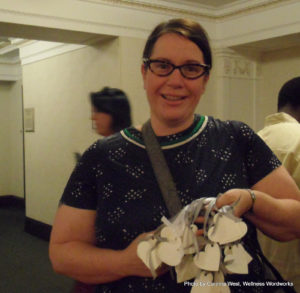Have you ever tried to do community engagement or join a coalition of people working on mental health stuff? How do you keep the disease model people from dominating? My friend Paul Komarek from ReDesigning Mental Illness says,
“Here’s my take. Coalitions are not social change vehicles. They are power transmission utilities. They are cultures of their own. They’re imperfect. Facilitated processes get what they are aimed at. ‘The system’ has a kind of gravity. It draws resources to it. And people in systems have blind spots. They can’t even imagine what outsiders consider normal. So: take power, don’t wait for it to come. Make demands you can stand up for. Unless it’s your coalition, it’s not ‘the’ coalition, it’s THEIR coalition.”
Research on Including Disenfranchised Viewpoints in Coalitions
If you have been unhappy doing coalition work or community engagement, they may have said it was you. They may have complained that you were too demanding or too triggered by your trauma issues. But the problem is not on us as advocates. This is a structural problem. Research by David Chavis from the Community Science Institute shows that coalition decision making often is incapable of hearing from oppressed or disenfranchised voices. This may be despite the best intentions of members of that coalition. One coalition I was in here in Kansas City, every single member of our steering committee was deeply committed to hearing from recovery movement advocates. Yet the funding came through mainstream sources, the committee was dominated by people who adhered to a disease model view of emotional distress. It was a project about “community solutions,” and yet we had to continually fight to define community as “actually in the community: ie. Churches, schools, boxing clubs, gardening groups, yoga studios.” Many other cities working on that same project had obviously slipped with this concept and obviously defined community as “a community mental health center.”
In our city, we also struggled with inviting advocates to the table yet punishing them for remaining advocates. This tension between mainstream funders and coalition members is quite common, according to David Chavis’ classic research article with 128 citations called “The Risks and Promises of Community Coalitions.”

In this article, he explains that hearing voices like the recovery movement is basically impossible in a coalition based structure. Despite the best intentions of many people in a given project, coalitions are always likely to struggle with mixed loyalties, accountability, status quo vs, visionary debates, diversity struggles with different faction needs, scarce resources, and lead agency domination.
How This Affects Advocates:
What is worse is that advocates have become actively discouraged with the whole process of community engagement. One advocate from North Carolina says,
“I am distancing myself from organizing, in part because my experience trying to work with and engage with the local coalition for a “recovery oriented system of care” and organize toward community engagement under the Creating Community Solutions banner was such a rip. So much is problematic in efforts to be a part in making change in the way we approach mental health/being human. These dialogues were – in the end – a platform for the existing paradigm (seek mental health treatment) to assert itself.
“I saw footage from one city where – in opening the dialogues – they shared anecdotes and quips like “so, maybe you have family member whose just not seeming right, he’s quiet, spends a lot of time by himself, might be acting a little, you know, maybe a little off, might just be he needs some medication!
“The issue – or one of them, anyway – is that almost everyone who is involved in the mental health and community care systems has been brought up in and educated in the rhetoric and beliefs of the medical model. So that is the foundation (literally, in some cases) that the creating community solutions dialogues were organized around. So, participation as a psychiatric survivor and as A peer was fraught with stresses, microagressions, and straight up wounds. To be fair, there were some really really good people involved, but they were all so busy that organizing a series of community dialogues just wasn’t happening and that contributed to the failure of the initiative. It’s problematic that the President did this whole big thing and blah, blah, blah and then *nothing much changes*. (ahem.)”
In my own resignation letter from Kansas City’s steering committee, I said,
“Unfortunately, I can no longer afford to do this kind of advocacy work on a personal or professional level. Each time I came to one of our meetings it activates my trauma issues and costs me days or weeks of productive or non reactionary work time. At every meeting I was forced to educate people about a mental health civil rights movement that some didn’t even know existed and others wanted to marginalize.”
And, again, this experience is not alone in academic literature. A review of community engagement projects found that many community members exprienced signification amounts of negative wellbeing impact for their efforts. The highest risks were for people with disabilities and people working in projects based on “consulting” instead of shared tasks or co-production:
It was also found, however, that community engagement could pose risks for personal well-being, and that the potential gains may be unevenly distributed. Importantly, for some ‘vulnerable’ groups, such as disability and older people, the negative consequences of engagement may outweigh the perceived benefits. It is important therefore that those planning such initiatives are sensitive to users’ specific concerns and support requirements, comprehensively addressing their requirements throughout the process of participation.
So next time you are asked to join a committee and you feel like it may be a waste of time? It may be too traumatizing? It’s not just you. If they are not really, really ready to hear what you have to say, you might as well stay away. I usually do more positive posts, but sorry, I feel that “Peer input” and “nothing about us without us,” is actually a real hazard to our health unless it is done very skillfully. And so many groups think the process will happen by magic and they set us up for failure by not using good science on community engagement.















A common story that does not just effect those wishing to work outside the medical model of mental illness.
I used to go to consultations on redesigning mental health services and also lead one. Everything I said, or that I enabled the service users to voice, was ingnored. So I would not do so again unless I had checked before hand that my input really was valued with measures in place to make sure that was going to happen.
I have found the climate movement to be lead by upper middle class, mainly white, 25 – 35, year olds who want to include the working class and who think that dealing with oppression of all kinds is really important but who struggle to listen contsructively to anyone outside thier demographic. So it isn’t just mad issues that this applies to.
Report comment
This is why I’m glad I don’t work in reforming mental health. It is so much better to leave the “System” and be involved in a regular job with relatively “normal” people. With my website, I mainly try to speak to people from an independent, external 1-to-1 position about leaving the System, i.e. not believing in one’s diagnosis, stopping taking drugs if possible, stopping seeing psychiatrists, and how to find an effective non-medical psychological therapist.
Arguing with ignorant sheep about whether life problems are brain diseases and whether drugs are necessary is mostly a waste of time… one does get jaded by it after a few years. Most of these people who believe in the medical model don’t even know what they’re missing.
The existing behavior control system is basically a con game designed to generate billions in profits for the drug companies and to control undesirables (i.e. people acting in ways that scare others). If the profits are seriously threatened – and they are threatened by the truth that drugs are rarely absolutely necessary, that drugs don’t do jackshit for most people in the long run, and that life problems are not brain diseases – then those introducing those truths will be attacked. One’s energy is better directed elsewhere rather than arguing with ignorant bleating sheep and fighting the drone-like minions of the corporations.
Report comment
Here’s a video of the local NAMI family meeting in my city:
https://www.youtube.com/watch?v=qRdmAscQbDg
Report comment
LOL! You are so bad!!!
Report comment
Hmmm. What I see are oppressed sheep in cages complaining like hell. Shouldn’t they be? Wouldn’t NAMI discourage that, except maybe for requesting nicer cages?
Report comment
Are the black sheep the one’s that are still non-meds compliant? They need more brainwashing–I mean education.
Report comment
Part of your difficulty with the sheep and company droids is that they aren’t medical enough (well, the droids are pushers, not doctors). If you wanted to make their lives miserable, you could mention a multitude of origins for certain “mental” diseases for which psychiatric medications are useless, such as thyroid disease, heavy metal poisoning, allergies and essential mineral and nutrient deficiencies and dependencies (anxiety and magnesium deficiency is a good one for the drug boys). As you can tell, I can find plenty of reasons to care for the organic in addition to life’s relational/spiritual/etc, difficulties.
Report comment
I agree, it’s aggravating to see this repeating and repeating, to the point where it would appear that injustice and marginalization is the familiar dynamic in this endless cycle. That’s not change, but more of the same.
As I navigated the advocacy world, it seemed there was more emphasis on conflict rather than clarity, as if people were simply looking for a fight. It seems impossible to avoid conflict and be wholly one’s authentic self in the mental health world–which is what actually leads people to seek support in the first place. That is the nature of oppression, and it seems hard to avoid this in groups. Bullies always seem to take over, and wear down everyone’s defenses that do not agree with them.
Still, there is something to be said about being an example of standing in one’s truth despite the triggers and insecurities of others, and simply not responding to the false beliefs of others, but instead, using these opportunities to learn about ourselves by how we react to that with which we do not agree. Otherwise, how will we ever achieve peaceful diversity? We teach by example.
Thanks for this very honest post.
Report comment
EXACTLY. CORRECT. And furthermore…. Here in my small hometown / college town, we’ve been burdened by the local “Community Mental health Center”, which ironically claims to be well over 100 years old! (The Federal “CMHC” Act was signed in 1964 – do the math….) And, in 1995, a State-wide, private, 501(c)3 “Agency” sent a couple workers here to organize a “Peer Support” center. I attended, being interested in these things, and was soon selected to be on the original founding Board of Directors. We had to set up our bank accounts through the local CMHC, until our own accounts and 501(c)3 status could be finalized. The local CMHC did everything they could to stonewall us, and even played games by withholding our money. Our “Peer Support” agency was supposed to complement the CMHC, not act as “competition against”, but that’s how the CMHC say us, and treated us. “Loyalists” to the local CMHC were inserted on the Board, to subvert our work, and make sure that our “independent” agency toed the CMHC party line…. Soon, I was forced off the Board because I was TOO recovery-centered, and too compassionate to those who suffered iatrogenic harms. We all need to realize – the so-called “medical model” of so-called “mental illness” represents something very, very, very old in humanity. GREED. POWER. CONTROL. MONEY.
What does Pharma, and the pseudoscience of psychiatry represent? GREED POWER. CONTROL. MONEY. So, all these “community coalitions” are just window-dressing. We can never be empowered by a system which exists solely to ENSLAVE us…. Thanks, Corrina….
Report comment
Great article. Important for international work also, where the exact distinction between community mental health and real community is very much at issue in the application of Article 19 of the Convention on the Rights of Persons with Disabilities, on living independently & being included in the community. I address this in a submission to the CRPD Committee for their preparation of a General Comment on this provision. https://dk-media.s3.amazonaws.com/AA/AG/chrusp-biz/downloads/302948/CHRUSPArticle19.pdf.
I am going to share your article and also hope it can be translated as it is an issue everywhere.
Report comment
Tina, please accept my full and express permission to use any and all of my comments, in your work…. In fact, *PLEASE**DO*!
~Bradford
What ELSE can I do to help?_________________?
Report comment
I see a great need for political action that itself is crippled by the reticence people have to get involved, somewhat exasperated by the omnipresent NAMI, parents against adulthood and for state control. This is particularly true in the southeastern United States where progress proceeds at a snail’s pace, mostly, in relation to the rest of the country. We need the coalitions we don’t have, to protect people from harmful, if lawful, actions on the part of the state, and desperately. I’d rather see the system fail than people, or to put it another way, I’d rather see the system not fail so many people. It’s not a broken system so much as it is a failure track, and the way to surmount it is to fight back.. We don’t have the organization we need in the south, and it is definitely something that I’d like to see us develop. Trying to organize a demonstration down here is like pulling teeth. First, you’ve got the sheep-like patients being led to the slaughter, intent on having a medical condition, and not freedom from such ultimately disastrous treatment, and second, you’ve got a lot of people reluctant to see anything but a threat in certain marginalized (de-voiced, de-represented) peoples. Given this situation, a betrayal of people and aims is often easiest course of action for people to take, however, it doesn’t do anything to .lessen the growing severity of the situation, oppression-wise, people are forced to operate under.
Report comment